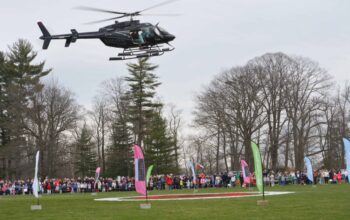Joelle Anselmo, Reporter
@janselmoCourant

The NCHS VEX Robotics team recently qualified for the World Championships of VEX Robotics, as they scored 7th place overall at Regionals, on the weekend of March 3rd. The team of nine members will be attending the World Championships from April 25-28 this year in Louisville, Kentucky, where 1,000 teams from around the world will compete.
Every year, VEX teams receive a certain task that their robot has to perform, whether that be shooting hoops into a net or stacking cones at record speeds. This year, their challenge is to create a robot that stacks as many mobile cones as possible and then move them into different scoring zones for additional points. There are two parts to the competitions: The first is a 15 second autonomous period, where the robot moves by itself, and the second is a 1:45 second period where a driver from the team controls the robot.
To complete the task, the team gets a box full of parts that they must use in order to make the most efficient robot possible. The rest is all self-taught, including coding, programming, designing, building and more.
Joshua Siegal, senior and President of the VEX team, does everything from team management to coding and programming. Since a lot of the season is a matter of improving the robot, experimentation is key to succeeding, “The biggest lesson is how much you can learn from your mistakes and how much of a virtue failure really is,” Joshua said.
Every member of the club takes on different tasks to eventually find one that they are passionate in pursuing. Casey McCall, sophomore, is one of the main programmers in the club. At the Regionals match, he had to talk and interview with potential alliances to make sure they worked well together, “I was there to help them debug and make the process go a little faster so they work better with our robot,” Casey said.

For the Worlds Competition, Casey is more focused on the programming of the robot, rather than its build. “The build was generally consistent and working well. For Worlds, we want to develop our programs more so that we are more successful in the autonomous part of the competition,” he said.
James Zambarano, a Technology Education teacher and VEX advisor, knows that the basics of robotics lies in creativity. “The tasks change every year, but the process is the same. It’s going from concept to creation,” he said. This year, Joshua created a new code called PID logic, Proportional Interitical Derivative, where the robot can self-correct and continue its task even if it goes off course. “It’s autocorrect, meaning if I say move 90 degrees, it does it. If I move it off path, it moves back,” Josh said.
Mr. Zambarano has taken a more hands-off approach with his students, “Their achievements and success are theirs, I’m just along for the ride,” he said. “As far as I’m concerned, as a teacher, father, mentor and advisor, we’ve already won. The experience, whether they win or lose, will be the same.”
For the members of the team, robotics isn’t just about winning competitions and stopping there. Joshua said, “I thought it was about ‘How do I make a better robot?’ But as I progressed, I realized it’s about ‘How does the robot make you a better person? And together, how can we make a better world?’”



